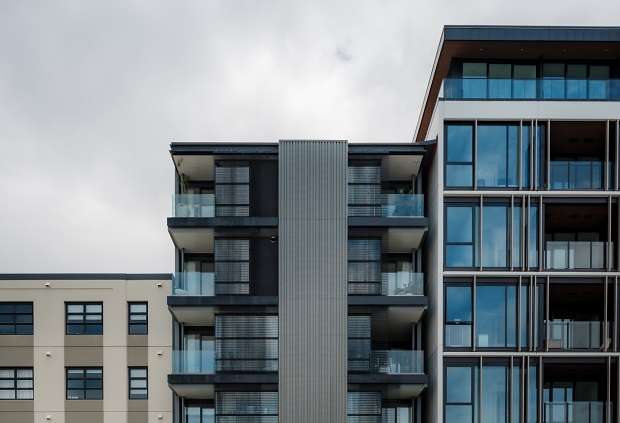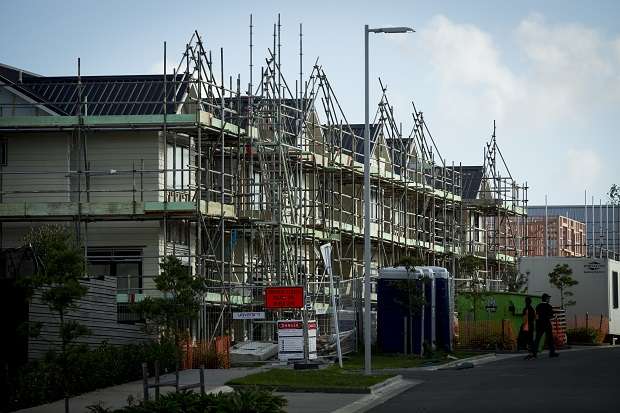First-home buyers of new builds may get a rude shock when their bank finance approval expires before their home is finished.
Experts say that drawn-out building timetables, hampered by lengthy council consenting delays, as well as materials and labour shortages now stretch out beyond the expiry dates for finance pre-approvals, leaving buyers committed to a purchase they may no longer be able to pay for.
READ MORE: Find out if your suburb is rising or falling
“It’s a real big issue,” says mortgage broker Rupert Gough.
Start your property search
“From the bank’s point of view, as soon as they issue a pre-approval, they have to have that money as a funding line so that it’s there for anyone who turns up to get their money.
“But the buyer is putting themselves at risk [signing on for a house] if they have to reapply for finance – they might have lost a job or had a baby, their financial circumstances have changed. Or in that year, policy around LVR deposit ratios or something changes and the bank can’t guarantee that approval.”
Gough, who heads Mortgage Lab and writes for OneRoof, says that builds where the buyers have to make draw down progress payments in stages (for a house and land package, for example) are less risky than buying off the plan for a turnkey project that requires just a deposit and no more payments until the townhouse or apartment is ready to occupy.

Apartment builds can stretch out beyond the usual 12-month finance pre-approval deadlines. Photo / Supplied
“It’s hopeless for the people with 10% deposit, it can be a real grey area for banks whether people will be good for the balance in a year’s time. It’s less of an issue if there’s a 30% deposit, or people with a good income.”
Gough says that buyers who no longer have finance could on-sell the property on the day of settlement, but that pool of potential buyers is reduced as investors cannot buy. Under the new rules, investors only get the tax break if they buy directly from the developer, not from a previous owner – even an owner of one day.
Those rules will not be clarified until October as part of the Government’s new tax regime, which was designed to encourage investors to buy new builds rather than existing homes.
“It needs clarity. Maybe banks could consider progress payments, or extend their pre-approvals out to 18 months, but it would be very messy for them.
“Everyone is keen for new builds because it is good for everyone,” says Gough.
Carol Pitman is sales manager for Solution Street, an affordable homes developer that currently has 106 homes in eight projects being built across Auckland, with another 100 approved and selling off the plans and more in planning.
“First-home buyers are under the pump and exhausted. They get pre-approval with conditions that last three months, so every three months we remind them that they need to re-contact their bank. One broker told me that everyone who has an unconditional contract is vulnerable, so we tell people to de-risk themselves.”
Pitman says that even for experienced developers like Solution Street, delays in council consents at both the beginning and the end of the project, and material shortages (right now, that’s appliances like ovens and dishwashers) push a project settlement time out.

Some developers advise buyers to buy only when building has started, not off the plans. Photo / Dean Purcell
“We try to be transparent but right now I can’t give people a date when we’ll be on site. Once we are, we have a platform where people can see every stage from consents issued to carpet laying, so they feel safe.
“These days we add a buffer of eight weeks just for the council certificate of completion. We had one where we waited 75 working days. We actually now give people a licence to occupy so that they can move in when the build is ready and settle when we get final consents. Our lawyers don’t like it, but we wanted to make our clients’ journey better.”
Pitman says that when buyers are “broken-hearted” over refusals from banks, she advises them to try again – even in two weeks.
“Conditions can change that quickly between brokers, the banks, new policies and products.”
Universal Homes’ chief executive Andrew Crosby says that the company doesn’t do pre-sales off the plans, selling properties only once they are out of the ground.
“We’re selling five or six months into a project, it’s always been a buyer risk buying off the plans. For a first-home buyer, I’d be very wary, as circumstances can change.
“A terrace house can be finished within 12 months, but apartments may take a lot longer. To minimise the risk, I’d say buy ones already out of the ground.”
















































































